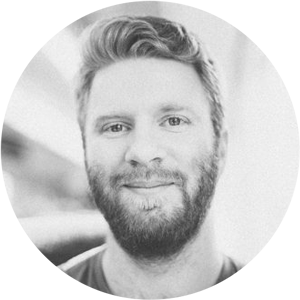How to Keep Improving Your Freelance Business

Part of being a freelancer is constantly improving the skills you offer your clients, and learning how to run your business better.
So today we’ve rounded up four of Melbourne’s finest, all experts in their trade and experienced freelancers, to share their hard-won advice on how to keep improving as freelancers, designers, and developers.

Spencer is a hard worker. As well as his own projects, he’s worked at Fabrica and Pentagram, and recently founded Happy Studio. When we met Spencer he was gallivanting around Melbourne on his Great co-working adventure for Desktop Magazine.
How can we be better freelancers?
Your relationships with clients are the most valuable asset to a freelance business. Make sure you take the time to build networks, meet new potential clients and stay in touch with old clients. Most of my work comes from referrals and previous clients I have worked with so it is vital to treat them well, leave a good impression and do your best design on every job!
How can we be better designers?
Practice. Practice. Practice. Don’t stop learning new skills, new technology/software and new subjects. Use side projects separate from your client work as an opportunity to explore new skills or techniques you are trying to learn. Watch, read and learn from all the amazing designers that have come before. There are tons of free videos from design conferences and articles online that can teach you how to be a better designer. Here is a list of some of my favourite resources that have taught me to be a better designer.

PAT ALLAN – Web Developer
Pat’s a Ruby developer, active OSS contributor, traveller, freelancer, organizer at Rails Camps and Trampoline, and all round nice guy.
Pretty busy, but he still took the time to share some advice with us.
How can we be better freelancers?
- Be honest with your clients. They shouldn’t expect you to know everything and answer every question immediately, so you’re allowed to say “I’ll get back to you about that”, or “I’ll need to do some research before I can be sure about how long that will take.” (And of course, do follow up on those questions.)
- Know what you’re worth, and don’t be afraid to charge that amount. I was lucky enough to have some business savvy friends walk me through how to figure out my rates – and that advice has been invaluable.
- Talk to people and share your knowledge. Find your peers, socialize with them (or network, if you prefer), go to industry events, write posts on a blog, and so on. This can lead to more work, it can lead to potential business partners, it can lead to greater confidence. And it can often just be fun, which is no bad thing.
How can we be better developers?
All of the above applies – but especially the last point. Beyond that, write a lot of code and read a lot of code.
The open source community makes this so easy – if you’re curious as to how a library you’re using works, look through the source code. Also, it can remove much of the mystery – releasing code is rarely a big deal, so don’t be afraid to do so.
There’s the added bonus that people using the code you release may come to you with projects, or you may have better opportunities for speaking at events. But the biggest advantage is that you’ll become a better developer – you’ll be constantly learning from others’ code, you’ll learn more about your language and tools, and you’ll become more effective at crafting high quality code.
Of course, this isn’t limited to development – the same would go for writing prose, designing branding, performing music – there’s a stack of truth to the cliché ‘practice makes perfect’.

DANIEL WEARNE – Interface Designer
Daniel is the man behind Peacock Studio, a board member at the Awesome Foundation,and tells it like it is in his blog at wernah.com
His work on dribbble makes me jealous.
How can we be better freelancers?
The biggest thing I learned starting and running Peacock, was in regards to client communication. We spend all this time at uni closing all these technical knowledge gaps, to then finally see that the big struggles and cause of failures are breakdowns in communication, not new versions of WordPress or super complicated code. Just like personal relationships, the biggest factor for client relationships is trust. Once you land them as a client, take the salesman hat off and start being as open as you can about the hurdles your facing and celebrating the mini-wins. This might might lead to short-term rockiness, but in the end when you nail it, you have a very loyal and happy client. And they don’t tell one or two people, they tell several. It’s always exponential.
This type of openness tends to attract the right kind of clients too. People who have freelanced long term will know what I mean by the right kind.
How can we be better developers?
My understanding of UX has changed substantially over the last couple of years. I now realize how much I used to get caught up in the look of an interface. That’s now the last part of my process. I now spend nearly 80% of the process from scratch in wireframes.
As interface designers, we become hyper-aware of the UI’s that we interact with everyday. We get really good over time at identifying pain points, poor flow and ‘UX fails’. The more skilled you get as an interface designer, the less resemblance you have to the typical user that you’re usually targeting.
At the end of the day, we’re power users. So I think the more experienced you get, the more important it is to remove your personal opinion from the feedback loop. You don’t want to get carried away to the point where it’s data driven design, it’s still an art and not a science, but definitely listen to your users.

David is an award winning digital designer, specialising in results-oriented design.
He is currently working in UI/UX at carsales.com.au.
How can we be better freelancers?
Over the years I have followed a systematic methodology and never taken shortcuts no matter how big or small the project is. If you follow the process of research, plan, design, build and monitor – having the client approve each step as you go, it leaves no chance for errors and miscommunication therefore producing an outstanding final product with all parties being satisfied. Once you get the rhyme going, it allows you more time to push the benchmark for online excellence.
How can we be better web designers?
The best way to practice your design and web skills is to find an inspiration piece of work and try to analyse how they have complied the elements to make it all work. As a side project you may want to challenge yourself by attempting to mimic this piece of work, you would be surprised with priceless techniques and knowledge you learn on the way – this will definitely make you a better web designer. It is also important to always listen to your clients but not feel forced to take on all their suggestions – as they say “would you advise a rocket scientist on how to do their job?” this also applies to web design. Take on board what clients tell you but filter it out and work with the foundations, always have control of the project.
Simple Invoicing & Time Tracking
Quit worrying about tracking time, invoices and estimates and complicated software. We got you.

